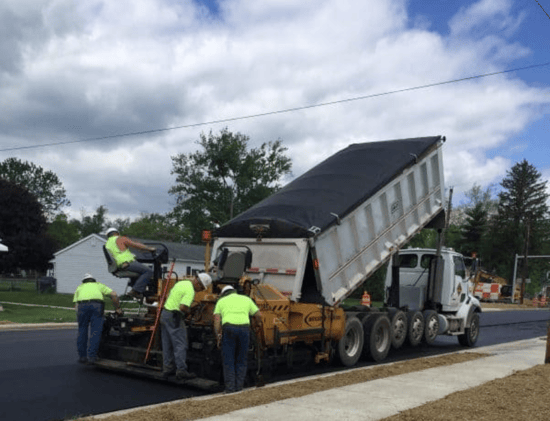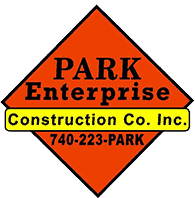
Editor's Note: This blog post was originally posted on March 8th, 2018 and was updated on July 13th, 2018.
A great contractor can build even greater things. One thing it can’t do, however, is work miracles or read minds. There’s a level of communication that must happen between you and your contractor to ensure a successful project.
At the beginning and end of the day, your contractor is there to help solve your problems and fix what keeps you awake at night.
- Is your parking lot falling apart?
- Are you uncertain if your aging underground piping will spring a leak?
- Is a structure standing the way of your organization’s growth?
- Do you need a brand new facility?
A civil construction company develops and manages the construction of projects like:
- Roads, highways, and other driving surfaces
- Underground utility infrastructure
- Bridges
- Tunnels
- Site development
These projects are often planned with a civil engineer and coordinated with government contracts or private enterprises. Or the construction company with the proper experience and credentials could serve in a civil engineering capacity.
And How Does Involving a Civil Contractor Help My Project?A construction project has many physical, logistical, contractual, and legal components. These services include (but aren’t limited to):
- Planning, surveying, and technical drawing/CAD
- Government regulation compliance
- Permitting processes
- Cost estimates and contracting
- And, of course, physical site construction services
But before they can help, there are a couple of things they need from you to begin. Here’s what you need to bring to the table to express your needs and help organize the project through the final punch list.
1. What’s Your Problem?
You don’t have to have it all figured out. Even if you’re vaguely aware that something needs to be done on your commercial property, your contractor can use that as a foundation toward finding a solution.
Sometimes the issues are pretty straightforward. Anyone who’s ever bottomed out in a pothole knows that driving surface needs to be fixed or replaced. Sometimes the issues are more complex. You may not know, for instance, that a corroded underground water pipe is hours from bursting.
But the signs are always there - subtle or obvious. Just as you would tell a doctor your symptoms, describe your property’s symptoms to your contractor for the right prescription.
2. What’s Your Budget?
This can make or break any civil construction project. Many good plans have fallen victim to poor financial foresight.
Each component of a project has a price:
- Labor
- Supplies
- Permitting/licensing/zoning
- Transportation
- Administrative costs
- Property acquisition
Budgetary line items could span all parts of the job over multiple contractors and subcontractors. Have an idea what you can afford upfront, and then work with your general contractor to determine if it meets your project’s scope.
Whether you’re financing the work or tapping your organization’s improvement or emergency funds, leave yourself some extra wiggle room. Unforeseen circumstances can severely hamstring a project’s budget.
3. What Are Your Plans?
If you require emergency work, the planning stage may unfortunately be very brief or nonexistent. But if you’ve had time and multiple heads thinking about it (perhaps you work alongside a project manager, buildings and grounds superintendent, or board of directors), you should have a relatively detailed plan of attack.
Plans roll more smoothly with an architect involved. Admittedly, not everyone has that luxury. In which case, do your best to sketch out the work you need. Even if your sketch is on a napkin, an experienced civil construction contractor can fill in the missing construction elements and draft detailed drawings/instructions before work begins.
4. What’s Your Timeline?
Is this a simple asphalt overlay that can be completed in a day or building a new facility that could take several months? Perhaps you have 2 months to shore up your parking lot before winter or 2 weeks to demolish a structure to make way for pending property upgrades.
Discuss a timeline with your contractor to get all the working parts and logistics in order to meet your deadline. If the deadline is fast approaching, it may require a little overtime to finish on time. Don’t have a deadline? Discuss start and completion dates anyway to ensure the project gets done smoothly and effectively.
5. Will Employees, Customers, Neighbors, or the General Public Be Affected?
Sometimes operations continue as normal with ongoing construction at your facility. Other times the construction is so extensive and intrusive that people couldn’t possibly work there. The same could be said for clients and visitors to your location. Would they be able to safely move about your property with relatively little hindrance or annoyance?
How about nearby traffic and neighbors? Will they be able go about their day-to-day in safety?
Construction and demolition often require:
- Detours
- Exclusion zones
- Partial or complete closures
- Legal notifications/permissions/signage
- Courtesy notifications
Keep everyone else in mind as you embark on a construction or demolition project.
6. What and Where Are The Dangers?
If you’re in a structure built before 1980, chances are it contains cancer-causing asbestos in multiple locations including:
- Insulation
- Flooring/subflooring
- Exterior/interior masonry caulk
- Roofing
(Click here for a more extensive list of asbestos containing elements in commercial and residential properties.) If it’s there and your project involves any demolition work, you could be legally bound to hire a hazmat team to perform an asbestos abatement.
But dangers aren’t limited to asbestos. (Click here for OSHA resources on hazardous materials and protocols.)
Presumably, you know your property well. Discuss potential problem areas and analyze a detailed utility schematic of the property, if available, before beginning work. And, as always, call OUPS (the Ohio Utilities Protection Service) to avoid an oops.
7. Do You Have Preferred Suppliers?
Supplies from your project must be sourced from somewhere. Perhaps you’ve developed a strong relationship and great pricing with a local vendor. If so, let your contractor know before the project begins, because they likely have preferred vendors on standby, as well.
Any vendor will promise smooth logistics. Far fewer can meet your pricing goals. Work with your contractor to choose wisely.
8. Where Will the Work Take Place?
Location, location, location. It means everything. Depending on location, construction or demolition could require:
- Rezoning
- Special use variances
- Permits for utilities, building, or tearing down
Your contractor must know and follow local, state, and federal laws. Regardless, discuss these realities with them to ensure everyone’s on the same page.
Are You Ready to Begin Your Civil Construction Project?
If you don’t have one or more of these elements figured out, at least at a high level, you’re probably not ready yet to approach a contractor. While an experienced contractor can fill in the gaps, it takes strong communication and planning from you and everyone else involved for quality assurance.



